Julian Assange’s lawyers on Tuesday argued before the High Court about why the imprisoned publisher must be allowed to appeal against his extradition order, reports Joe Lauria.
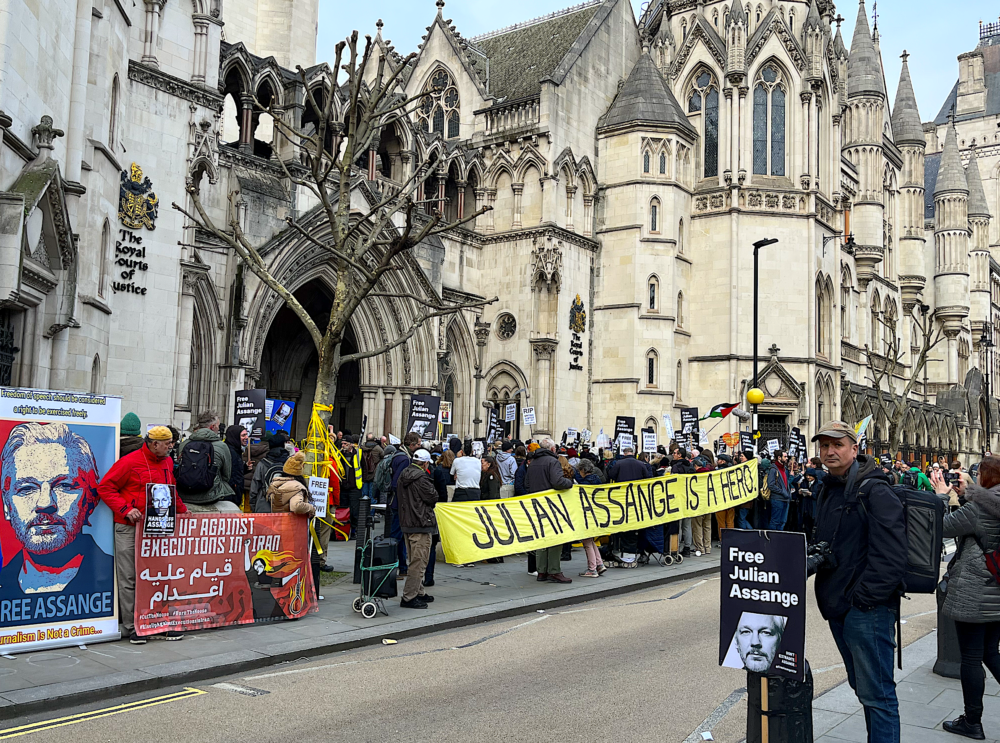
Scene outside the Royal Courts of Justice on Day One of Julian Assange hearing Tuesday. (Joe Lauria)
By Joe Lauria
in London
Special to Consortium News
On Day One of Julian Assange’s attempt to appeal Britain’s order to extradite him to the United States, his lawyers laid out a timeline that exposed U.S. motives to destroy the journalist who revealed their high-level state crimes.
Before two High Court judges in the cramped, wood-paneled Courtroom 5 at the Royal Courts of Justice, Assange’s lawyers argued on Tuesday that two judges had seriously erred in the case on a number of grounds necessitating an appeal of the home secretary’s decision to extradite Assange to the United States.
High to the left of the court, next to oak shelves with neat rows of law books, was an empty iron cage. The court said it had invited Assange to either attend in person or via video link from Belmarsh Prison, where he has been locked up on remand for nearly five years. But Assange said he was too ill to take part in any capacity, his lawyers confirmed.
Vanessa Baraitser, the district judge who presided over Assange’s 2020 extradition hearing, and Jonathan Swift, a High Court judge, came in for heavy criticism from Assange’s lawyers. Baraitser in January 2021 ordered Assange released on health grounds.
But she refused him bail while the U.S. appealed. On the basis of assurances that it would not mistreat Assange in the United States, the High Court reversed Baraitser’s decision. The U.K. Supreme Court then refused to take Assange’s challenge of the legality of these assurances and the home secretary signed the extradition order.
Assange’s last avenue of appeal is of the home secretary’s order as well as Baraitser’s 2021 decision, in which, on every point of law and many of fact, she sided with the United States. The application to pursue this appeal was rejected by a single High Court judge, Swift, last June.
He permitted his rejection of the application to itself be appealed. That two-day hearing began Tuesday before Justice Jeremy Johnson and Dame Victoria Sharp.
The Timeline
Assange lawyer Mark Summers made a forceful argument that the United States in essence is treating Assange no differently than any authoritarian regime would deal with a dissident journalist who revealed its secret crimes.
“There was evidence before the district judge that this prosecution was motivated to punish and inhibit the exposure of American state-level crimes,” Summers told the court. “There was unchallenged evidence” during Baraitser’s 2020 extradition hearing “of crimes that sit at the apex of criminality,” he said.
He said there was a direct nexus between Assange’s work to expose U.S. crimes and the U.S. pursuing him. “This is a prosecution for those disclosures,” he said. “There is a straight-line correlation between those disclosures and the prosecution, but the district judge (Baraitser) addressed none of this and neither did Swift.”
Summers then sketched out a timeline of events showing successive stages of motivation for the United States to go after Assange. “There was compelling circumstantial evidence why the U.S. brought this case,” he said.
First, he said, there was no prosecution of Assange (despite the Obama administration empaneling a grand jury) until 2016, when the International Criminal Court announced it would look into possible U.S. crimes in Afghanistan, following Assange’s disclosures. The U.S. then denounced him as a political actor.
Summers said “that morphed into plans to kill or rendition Assange” from the Ecuadorian embassy, where he had asylum, following the Vault 7 release of C.I.A. spying tools in 2017.
The then new C.I.A. Director Mike Pompeo, in his first public appearance in that position, denounced WikiLeaks as a hostile, non-state intelligence service, a carefully chosen legal term, Summers said, that permitted taking covert action against a target without Congressional knowledge.
Because these plans to kill or rendition Assange, asked for by President Donald Trump, raised alarms with White House lawyers, a legal prosecution was pursued as a way to determine where to put Assange if he were renditioned to the U.S., Summers said.
“This prosecution only emerged because of that rendition plan,” he said. “And the prosecution that emerged is selective and it is persecution.” It was selective because even though hundreds of other outlets, such as cryptome.org and Pirate Bay had published the unredacted diplomatic cables first, Assange was the only one charged.
“This is not a government acting on good faith pursuing a legal” path, he said.
Summers said Baraitser never raised the question of why six years went by after WikiLeaks‘ publication of Iraq and Afghan war logs before Assange was prosecuted and never asked what had suddenly triggered the U.S. to act against him. Baraitser knew the ICC was going to investigate Assange’s Afghan exposures, Summers said.
“There was reasonable evidence to link the two, but the district judge didn’t mention it,” he said. She also ignored the plot to kill or rendition Assange, even though she had heard evidence about it in her court. “The district judge didn’t know that charges were brought [against Assange] to give sustenance to an illegal rendition plan,” he said.
A Political Offense
Summers said that Assange’s “exposure is a political act, a political opinion against state criminality.” And Assange lawyer Edward Fitzgerald called espionage, with which Assange is charged, a “pure political offense.” The issue is crucial to Assange’s defense because the U.S.-U.K. Extradition Treaty bars extraditions for political offenses.
However, the Extradition Act, Parliament’s implementing legislation of the Treaty, does not mention political offenses. Baraitser ruled that the Act and not the Treaty should take precedence.
Assange’s team has been arguing that he is wanted for a political crime and therefore the extradition should not proceed. They argued that the Act bars extradition for “political opinion,” which they equate with “political offense.”
A considerable amount of time in the five-hour hearing was thus spent by Assange’s lawyers making the point that Assange’s charges are political. Fitzgerald argued that Britain has extradition treaties with 158 nations and in all but two (Kuwait and the UAE), political offenses are barred.
Assange’s work was to influence and change U.S. policy, Fitzgerald said, therefore his work was political and he could not be extradited for his political views or opinions.
Informants!
Justices Johnson and Sharp appeared to be not extremely well-versed in the Assange case and seemed at times surprised by what they were hearing from Assange’s lawyers. But they had been prepared on the U.S. view of Assange allegedly harming U.S. informants.
What they didn’t know is that Assange had actually spent time redacting the names of U.S. informants from the Diplomatic Cables, while WikiLeaks‘ mainstream partners in 2010 did not.
Justice Johnson asked before lunch whether there were cases where someone had published the names of informants and were not prosecuted. After the break, Summers offered the example of Philip Agee, the ex-C.I.A. agent who revealed undercover agents’ names, some of whom were harmed, but he was never indicted for it.
Summers also mentioned The New York Times publishing names of informants in the Pentagon Papers. “The New York Times was never prosecuted,” Summers said. However, Richard Nixon indeed empaneled a grand jury in Boston to indict Times reporters but after it was revealed the government tapped whistleblower Daniel Ellsberg’s phone — and thus also the reporters’ — the case was dropped.
Despite their apparent unfamiliarity with the Assange case both judges seemed intrigued by its serious political, legal and press freedom issues. They are senior judges who might be less susceptible to political pressure.
The Death Penalty
The judges may also have been surprised to learn that under U.S. law and practice, (in this case with agreement from the British government), new charges could be added to Assange’s indictment after he would arrive in America. The Espionage Act, for instance, carries a provision for the death penalty if committed during wartime.
Britain does not have the death penalty and cannot extradite someone who could face capital punishment. Though the U.S. could offer Britain diplomatic assurances that it would not seek the death penalty against Assange, so far it has refused.
Fitzgerald also seemed to shock the courtroom by speaking of instances in U.S. courts where someone convicted for one crime could at sentencing receive time for another offense he or she was never tried for.
He expressed concern that though Assange was never charged with the Vault 7 C.I.A. leak, he might still be sentenced for it. He also said that at sentencing the rules of admissibility could be discarded, for example to consider evidence that was obtained through surveillance.
First Amendment
The judges may have been surprised to hear that the U.S. prosecutor in Virginia has said he may deny Assange his First Amendment rights during trial on U.S. soil because he is not a U.S. citizen. Pompeo stated more categorically that Assange would be without First Amendment protection.
Stripping the right of free speech is a violation of Article 10 of the European Court of Human Rights, Assange’s lawyers argued.
What Strasbourg Would Do
Summers brought the court through a scenario in which the European Court of Human Rights had tried Chelsea Manning, instead of a U.S. military court. He said whistleblower protection laws in Europe had advanced to the point where he believed the court would have weighed the harm done by breaking a confidentiality agreement and the harm prevented by blowing the whistle.
He concluded that Manning would not have been convicted and said Assange would, in this scenario, be even easier to acquit because he never signed any confidentiality agreements.
This exercise may have been a message to the court: release Assange yourself before the European court embarrasses you by overturning your decision to extradite him.
The overall strategy of Assange’s lawyers appeared to be to make it obvious to these judges that there are vast grounds for appeal as well as arguments to toss the case (such as evidence of C.I.A. spying on Assange’s privileged conversations with his lawyers)
Forseeable
Assange’s lawyers also argued that Article 7 of the European Convention on Human Rights says someone must foresee that their behavior is a crime before he or she could be charged with it.
They said Assange could not have known that publishing his classified disclosures could have led to prosecution under the Espionage Act because no journalist or publisher had ever been charged under it for possession and publication of classified material. Therefore a violation of Article 7 should bar extradition, they say.
Assange was for years worried, however, that the U.S. would be hunting for him. And there were two previous failed attempts by grand juries to prosecute journalists: The Chicago Tribune during the Second World War and The New York Times in the Pentagon Papers case, as discussed above.
All-Star Gallery
In the seven rows of seats behind the lawyers’ benches in Courtroom 5 were 16 members of the European Parliament, including Clare Daley and Mick Wallace of Ireland. Sevim Dadelen, a member of the German Bundestag, was in the courtroom along with Alan Rusbridger, the former Guardian editor. Jeremy Corbyn addressed the crowd of several hundred protestors outside the court.
The hearing continues on Wednesday with lawyers representing the United States presenting their arguments about why Assange should not be allowed to appeal.
Joe Lauria is editor-in-chief of Consortium News and a former U.N. correspondent for The Wall Street Journal, Boston Globe, and other newspapers, including The Montreal Gazette, the London Daily Mail and The Star of Johannesburg. He was an investigative reporter for the Sunday Times of London, a financial reporter for Bloomberg News and began his professional work as a 19-year old stringer for The New York Times. He is the author of two books, A Political Odyssey, with Sen. Mike Gravel, foreword by Daniel Ellsberg; and How I Lost By Hillary Clinton, foreword by Julian Assange. He can be reached at joelauria@consortiumnews.com and followed on Twitter @unjoe

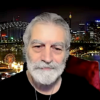
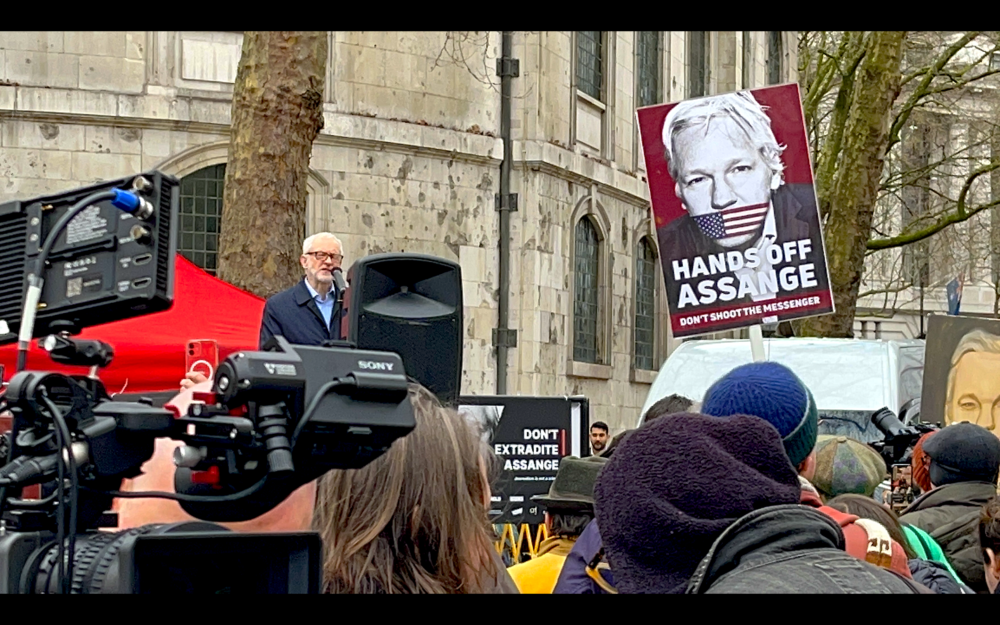
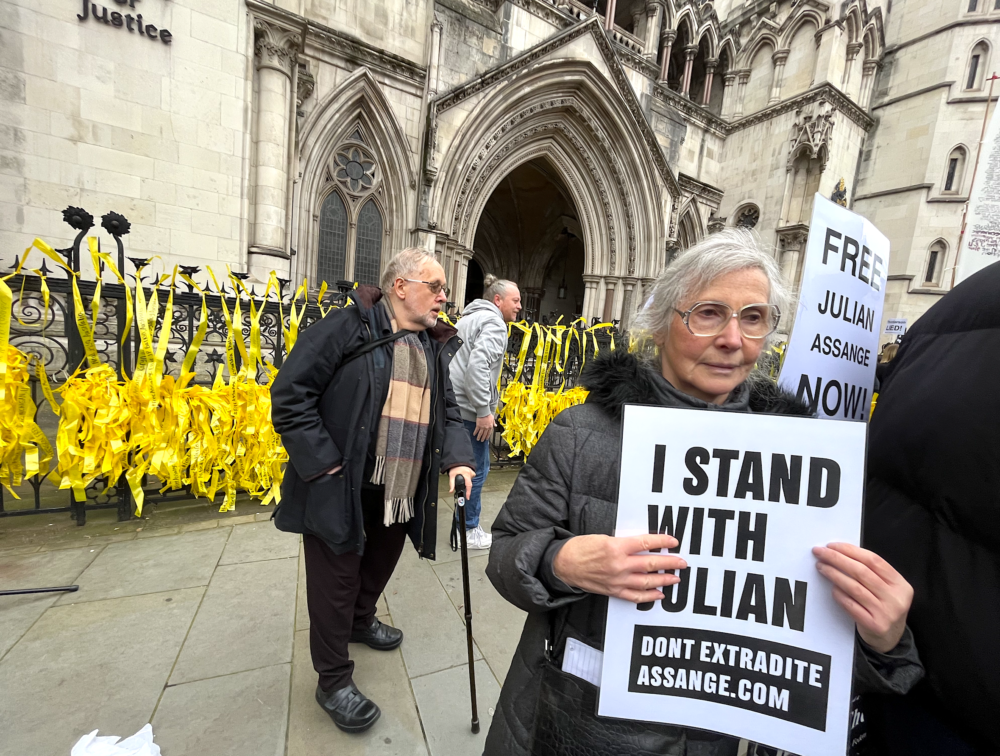
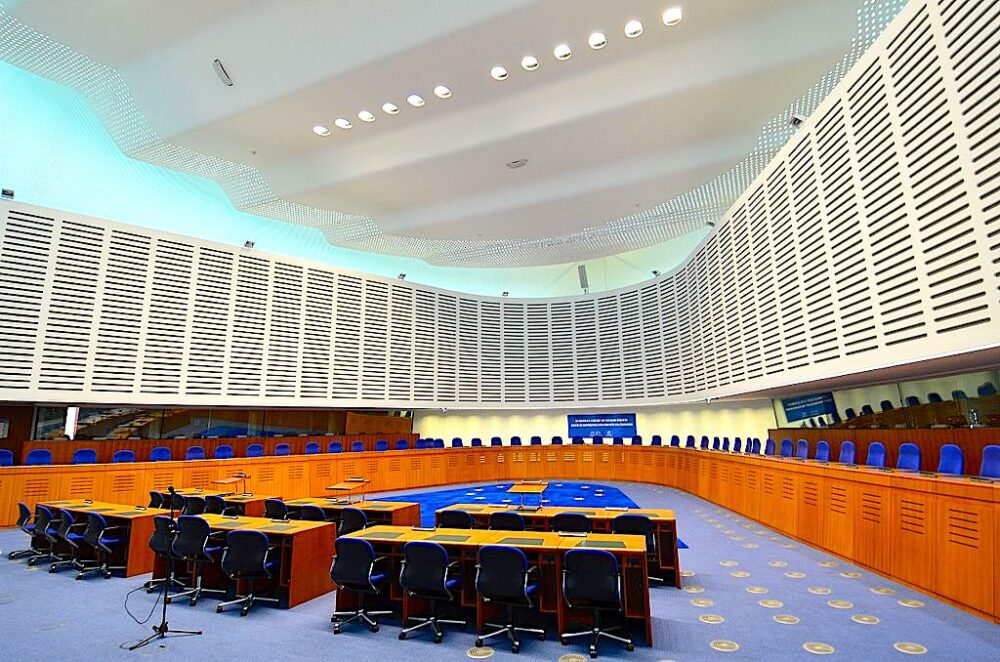
Well, the Guardian Newspittle, one of the media persecutors of Assange, has just included this in their “Explainer” column, which is like Stalin explaining why tens of millions must die in a purge of those failing to agree with their own, incipient deaths: “Trump – Biden’s likely rival at the 2024 presidential election – is seen by some as more favourable to Assange, given WikiLeaks’ subsequent role in the publication of Hillary Clinton’s emails prior to the 2016 election.” That’s the whole point of the “Explainer” column – to make certain you know what you cannot question. It’s already well documented that Wikileaks had nothing to do with Podesta making available those emails from Hillary Clinton through his own, phishing stupidity. And so Trump must be paraded out, even though the whole trial which took place to convict Assange, and the whole appeal now taking place to avoid extradition, would not even be happening if Trump had not tried to convict Assange on charges which even a mewling sycophant like Obama was afraid to pursue. They are trying to make Assange a threat to America through Trump’s possible re-election, just as they use Russia to disallow standard jurisprudence and Constitutional law in allowing free speech inside our borders. Why do we allow such sophomoric soporifics decide our discourse? It can only be that the money flows too easily to those willing to make arguments against even that semblance of democracy which we still have available.
UK declassified did research on the two judges hearing
Julian’s case, Johnson with close ties to UK MI6(like the
U.S. CIA) and the woman with close ties to UK prime
minister Theresa May, who was responsible for Julian’s
brutal removal from the Ecuadorian embassy.
Seems these two judges have predisposed political
backgrounds unfavorable to justice in Julian’s case
And Consortium News republished both articles.
And a personal heart-felt thanks to CN for being
so perfectly faithful to Julian through what looks
like persecution for all independent journalists
I didn’t connect Chelsea Manning to the Assange case until recently. Manning got off relatively easily, but the entire force of the DOJ and American empirical outreach is on Assange. I don’t know why there’s such a discrepancy. The First Amendment surely will prevail here in a publishing case, won’t it? btw, the US ought to be more careful about its support of war crimes.
The U.S. and UK have already accomplished their goal which was to destroy Assange’s efforts to continue any journalism that would continue to reveal their evilness, so why not just release him and let him go back to his country Australia to live out what days he has left. It breaks my heart to see what my country has done to Assange and others!
Surely the case is too flimsy and politically compromised to succeed for the extradition ploy. How can these senior judges, “who might be less susceptible to political pressure,” although they seem to be solid Establishment Representatives, risk whatever dignity they hold in the light of the extradition agreements and noble sentiments therein?
The risk to reputation is extreme and so, obviously, is lowering it a possibility. I mean the risk of disgrace and the embarrassment of this considering brought into the open so plainly–the political persecution and exposure of a UK – US transformation into a Stazi.
This opening by Julian’s lawyers looks promising.
Obama was a CIA tool
I am gratified to hear how often the justices were amazed by information that they knew nothing about. That fact in itself demonstrates the harm done by Vanessa Baraitser in her dismissal of all discussion of the actual facts of the case, amounting to what is at least misfeasance on the part of the court and what I would go so far as to consider judicial malfeasance. The fact that this information was unknown to the justices makes it very clear that the case should be thrown out.
Incarceration without due process; national laws applied illegally internationally; attorney-client privilege breached to undermine justice: who should really be on trial here? Certainly not Assange. And when has the legal decisions of the ICC ever mattered to the US? This is a witch hunt, and US prosecutors are the theocratic judges offering guilt by refusal to accept an unacceptable reality.
“The people are the only censors of their governors: and even their errors will tend to keep these to the true principles of their institution. To punish these errors too severely would be to suppress the only safeguard of the public liberty. The way to prevent these irregular interpositions of the people is to give them full information of their affairs thro’ the channel of the public papers, & to contrive that those papers should penetrate the whole mass of the people. The basis of our governments being the opinion of the people, the very first object should be to keep that right; and were it left to me to decide whether we should have a government without newspapers or newspapers without a government, I should not hesitate a moment to prefer the latter. But I should mean that every man should receive those papers & be capable of reading them.”
Thomas Jefferson
future victim of the Espionage Act, retrospectively.
Thanks so much, Joe, for this comprehensive summary of today’s proceedings!
Can we expect more 11th hour “assurances” from the US side that of course there will be no capital punishment for Julian?
(unless he “misbehaves”, like in the other assurances)
In addition to this article by Joe, one should not miss the excellent Roundtable, also on CN, which followed the day’s court proceedings.
Question: Why only two judges hearing the appeal? With only two, what happens if there is a split decision? Does Julian win the right to appeal if just one of the judges rules in his favor, or do both judges have to decide in his favor?